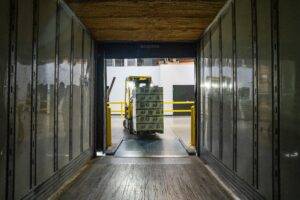It is impossible to foresee or avoid bad weather. Winter weather conditions, such as snow, blizzards, and low temperatures, are hazardous to all freight transportation. Extreme rain, wildfires, and hurricanes are just some of the meteorological hazards that tend to increase in frequency and intensity throughout the summer. Any one of these factors can have a significant impact on shipping cargo.
Tornadoes, deluges, hurricanes, and floods are just some of the natural hazards that could delay your cargo at any time of year across the country. Heavy snowfall can cause drifts to form on highways, making them dangerously treacherous. In a similar vein, floods are a real threat during stormy weather. A truck driver’s life is in serious danger in such weather. The trucking industry puts a premium on the security of both the driver and the cargo he is hauling.
Visibility reduces in bad weather, such as fog, snow, storms, or rain. In addition, this causes roadblocks and closures. The ports are either closed or operating at reduced capacities. Because of this, shipments will be delayed, and the shipper may not be able to deliver your package by the specified time.
Less trucks are available to make new deliveries when some are stranded in bad weather with undelivered cargo. Because of this, companies and groups may have trouble locating trucks for making regular deliveries. Moreover, since there are fewer trucks available, carrier charges increase.
Bad weather can have an impact on freight deliveries, which we address in this piece.
Some of The Major Weather Impacts Face By Grain Logistics Services
Air Cargo Weather Impacts
Cargo shipped via airline also suffers from poor visibility. Airline flights may be delayed if there is a thunderstorm or significant rainfall. Fog is a common hazard in many regions, making landing and takeoff more dangerous than they already are. The same is true for cargo flights when strong winds are present. These variables result from problems like late deliveries, longer travel times, and higher costs.
Weather and Waterway Freight
Significant threats to canal shipping include severe winds, high tides and waves, storms, and rainfall. When transporting goods via water, keeping the weather forecast in mind is essential. Without proper temperature regulation, perishable goods are at risk of spoiling. Products stored in glass containers run the risk of shattering. Severe weather can cause significant delays and even product loss when waterways transport goods.
How to Make Grain Shipments During Bad Weather
- Determine the Best Freight Transport Method
Picking the correct transport for your freight requires careful consideration of the available terminals and the road conditions along the route. Even though it’s impossible to know exactly how the weather will behave, you may still monitor weather reports and forecasts to prepare for any potential natural disasters that may delay or cancel your shipment. You can adjust your manner of shipment such that there are no delays or losses provided the parameters above are met. For instance, in heavy weather, you may reroute your freight shipments via airplane instead of boats and trucks. It may help you fulfill your deadlines and keep your things safe from the flood, but it will save you extra money.
Although a natural disaster may only affect a single area, it may cause significant disruption to the transportation networks serving the unaffected regions. Truck drivers may encounter difficulties and delays as a result of this. When bad weather hits, it doesn’t just affect one area; it has a ripple effect that affects other parts of the supply chain.
- The Logistics of Cargo Transport
If you take the time to arrange the route of your shipment, you can safeguard it from being delayed by adverse weather. When the weather is less than ideal, you could find it advantageous to depart from your standard shipping route. Alternate routes may lengthen the journey by a certain amount of time, but they are less hazardous for transporting freight and can help you avoid delays caused by inclement weather.
- Logistics of Cargo Transport
Preventing an issue before it arises is preferable to fixing it after the fact. For this reason, it’s best to anticipate the possibility of bad weather and make plans appropriately. If terrible weather is expected to hit a location your shipment must travel through after it leaves the pier, you may choose to reschedule your shipment’s departure. If you want to avoid potential problems, you can change the delivery date by a few days.
- Engaging a Third-Party Logistics Provider
A third-party logistics provider’s team of qualified experts might be invaluable when dealing with severe weather. These businesses employ reliable procedures to guarantee that your packages will be delivered without delays. Dedicated customer care agents at reputable 3PLs keep tabs on traffic conditions and terminal closures to promptly update their clients. So, they make sure bad weather doesn’t ruin your supply chain.
Wrapping Up
When severe weather is a factor, there may be delays because we will need to take precautions to ensure the safety of our vehicles, our employees, and the products that our customers have ordered. However, here at I-Way transport, we take great pride in the fact that we have robust contingency plans in place to deal with adverse weather conditions. Furthermore, whenever possible, we work with our world-class global partners to minimize the impact that adverse weather conditions have on our valued customers.




